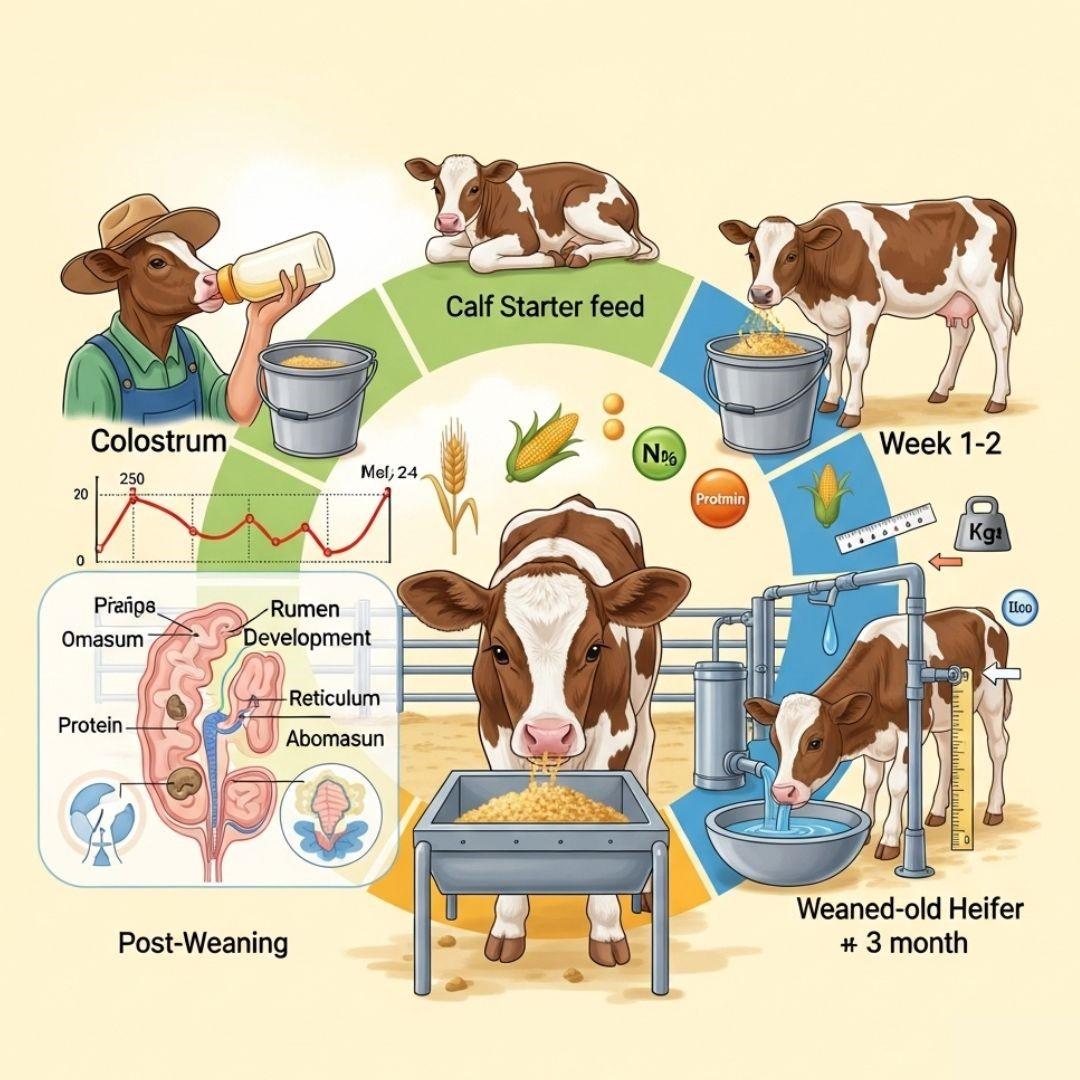How Proper Nutrition in Early Life Boosts Your Calf’s Future Milk Production

The first few months of a calf’s life are more critical than many realize. The kind of nutrition and care provided during this stage lays the foundation for the animal’s lifelong health and productivity. For dairy farmers, early-life feeding isn’t just about helping calves grow; it’s about shaping their potential as future high-yielding milk producers.
From colostrum feeding to weaning, every nutritional choice plays an important role in how well your heifers will perform later in life. Let’s walk through why early-life nutrition matters, and how the right strategies can directly boost your calf’s future milk output.
The Link Between Early Nutrition and Lifetime Productivity
A calf’s future milk yield is heavily influenced by how well it is nourished in the first weeks and months of life. Adequate nutrition ensures:
-
Strong immune system for better disease resistance
-
Faster growth and higher body weight at weaning
-
Early rumen development that improves digestion efficiency
-
Better fertility and earlier breeding readiness
-
Higher milk yields once the calf matures into a dairy cow
This makes the early stage not just about survival but about unlocking the animal’s full genetic potential.
Colostrum: The First and Most Important Feed
Nutrition begins immediately after birth with colostrum feeding. Colostrum, given within the first 2–4 hours, provides:
-
Antibodies to develop strong immunity
-
High energy to adapt to outside conditions
-
Vitamins and minerals that kickstart growth
A calf that receives ample high-quality colostrum is more likely to grow into a healthier, more productive cow in the future.
Milk Feeding: Building a Strong Health Base
After colostrum, milk or milk replacer continues to be the main source of energy and protein. Proper milk feeding supports muscle and skeletal development while maintaining consistent growth.
Farmers should focus on:
-
Feeding enough volume to meet the calf’s energy requirements
-
Creating a regular feeding schedule for consistency
-
Using clean equipment to maintain hygiene and prevent infections
Strong early growth helps calves achieve targets for body weight, which directly correlates with higher milk output later on.
Transition to Solid Feed: Starting Rumen Development
While milk fuels initial growth, shifting to solids is essential for preparing calves as future ruminants. The rumen develops best when calves are introduced to solid feed early. This ensures they adapt quickly after weaning and maximize nutrient efficiency.
Solid feed stimulates microbial activity in the rumen, helping it mature faster. This early rumen development is what transitions calves from monogastric nutrition to full-fledged ruminants capable of digesting forages and concentrates.
Importance of Calf Starter Feed
Introducing calf starter feed around 2–3 weeks of age plays an essential role in this transition. This feed is specially designed to support rumen development and provide essential nutrients. With its balanced composition of protein, energy, vitamins, and minerals, it encourages calves to nibble and gradually replace milk nutrition.
Benefits of using calf starter feed include:
-
Stimulates early rumen activity
-
Supports steady growth and body weight gain
-
Reduces stress during weaning by easing the shift from milk to solids
-
Lays the foundation for strong digestion throughout the calf’s life
By the time calves are fully weaned, those introduced early to calf starter usually show higher growth rates and reach production benchmarks faster.
Weaning: A Smooth Transition Matters
The weaning stage can be stressful if nutrition is not well managed. Successful weaning requires:
-
Calves consuming adequate solid feed daily
-
Access to clean and fresh water
-
A gradual reduction of milk feeding to minimize stress
Calves that are weaned smoothly continue to grow efficiently and are better prepared for farm life as replacement heifers.
Minerals, Vitamins, and Water: Supporting Hidden Needs
Often overlooked, minerals and vitamins are vital for growth, immunity, and bone strength. Elements like calcium, phosphorus, zinc, and selenium ensure calves build resilience right from the start. Providing clean, fresh water is equally critical, even in the early stages, for healthy digestion and feed intake.
Together, these nutrients ensure calves are not just growing in size but developing the physiological strength needed for future milk production.
Early-Life Nutrition and Milk Production Potential
Studies and on-farm experiences show a direct correlation between higher body weight in early life and greater milk production later on. Heifers that grow consistently during their calfhood perform more efficiently as lactating cows.
Farmers investing in calf nutrition today will see the returns once these calves enter the milking line, producing a higher volume and quality of milk.
Practical Feeding Tips for Farmers
To make early-life nutrition effective and easy to implement, here are some actionable steps:
-
Provide colostrum within 2 hours of birth.
-
Maintain hygiene of feeding tools and housing.
-
Introduce calf starter feed by the 2nd week.
-
Ensure water is available at all times.
-
Monitor calf weight regularly to track growth.
-
Keep feeding schedules consistent to reduce stress.
Consistency and attention to detail in these small practices add up to big results in the long run.
Sustainable Growth and Future Profitability
By focusing on nutrition in the first few months, farmers not only improve calf survival rates but also set up the herd for stronger profitability in the long run. Well-fed calves mature into healthier cows, have fewer health issues, and deliver more milk per lactation cycle.
Conclusion
Early-life nutrition is more than just helping calves grow—it is an investment in the future productivity of the dairy farm. Timely colostrum, balanced milk feeding, introduction of solids, and the use of calf starter feed create the right foundation for rumen development, body growth, and eventual milk production.
By paying attention to these details, farmers not only raise healthier animals but also secure higher milk yields, sustainable profitability, and a more resilient herd.
FAQs
1. Why is colostrum important for calves?
Colostrum provides immunity, energy, and essential nutrients that protect calves in the first weeks of life.
2. What is the benefit of introducing calf starter feed?
It helps develop the rumen, supports early growth, and makes weaning smoother and stress-free.
3. How does early nutrition affect future milk production?
Heifers that grow well in early life reach breeding age earlier and produce more milk across their lifetime.
4. When should calves start drinking water?
From the first week of life, fresh clean water should always be available to calves.
5. How do minerals and vitamins support calf growth?
They strengthen immunity, aid bone and muscle development, and improve overall resilience.







